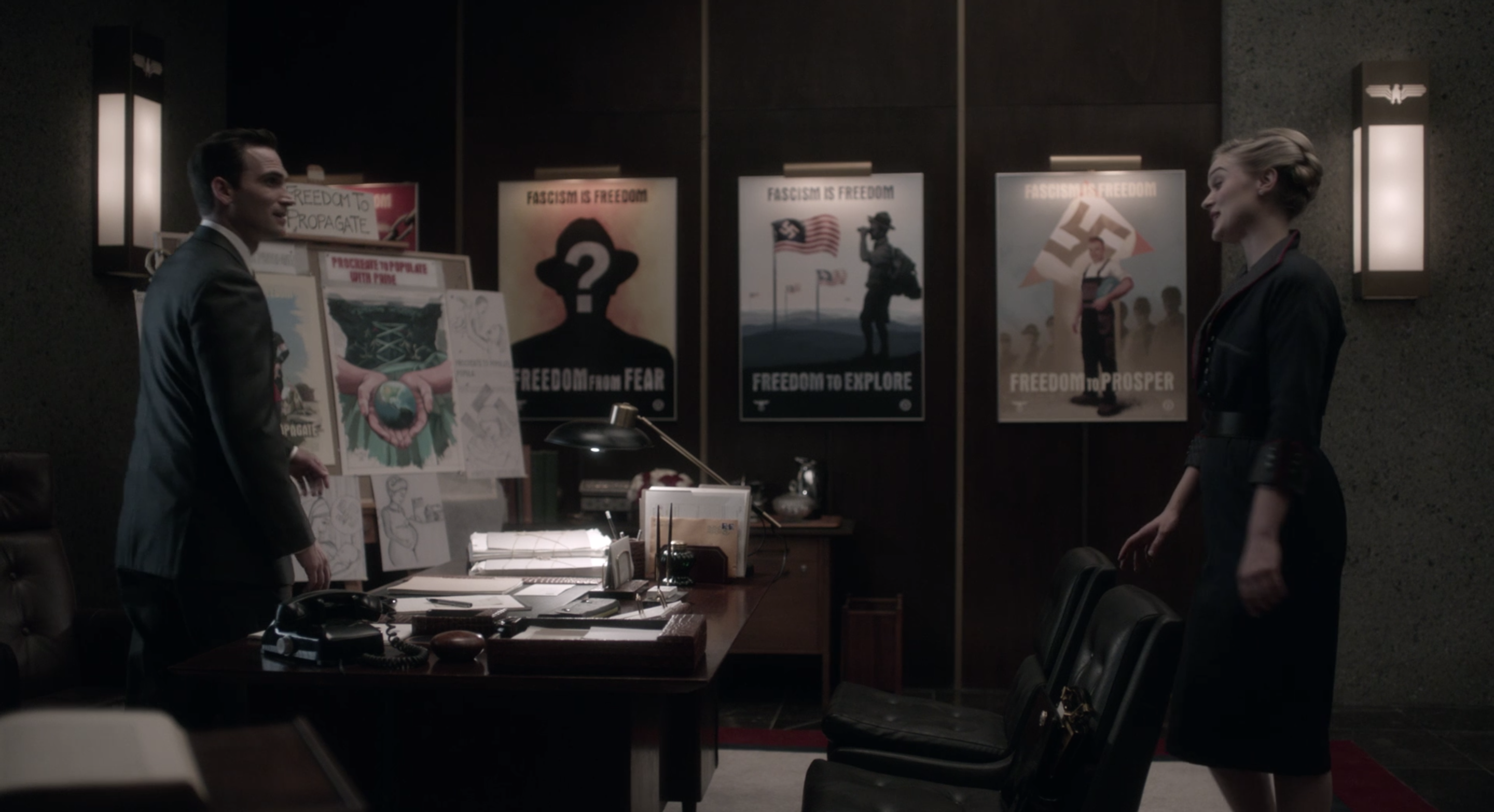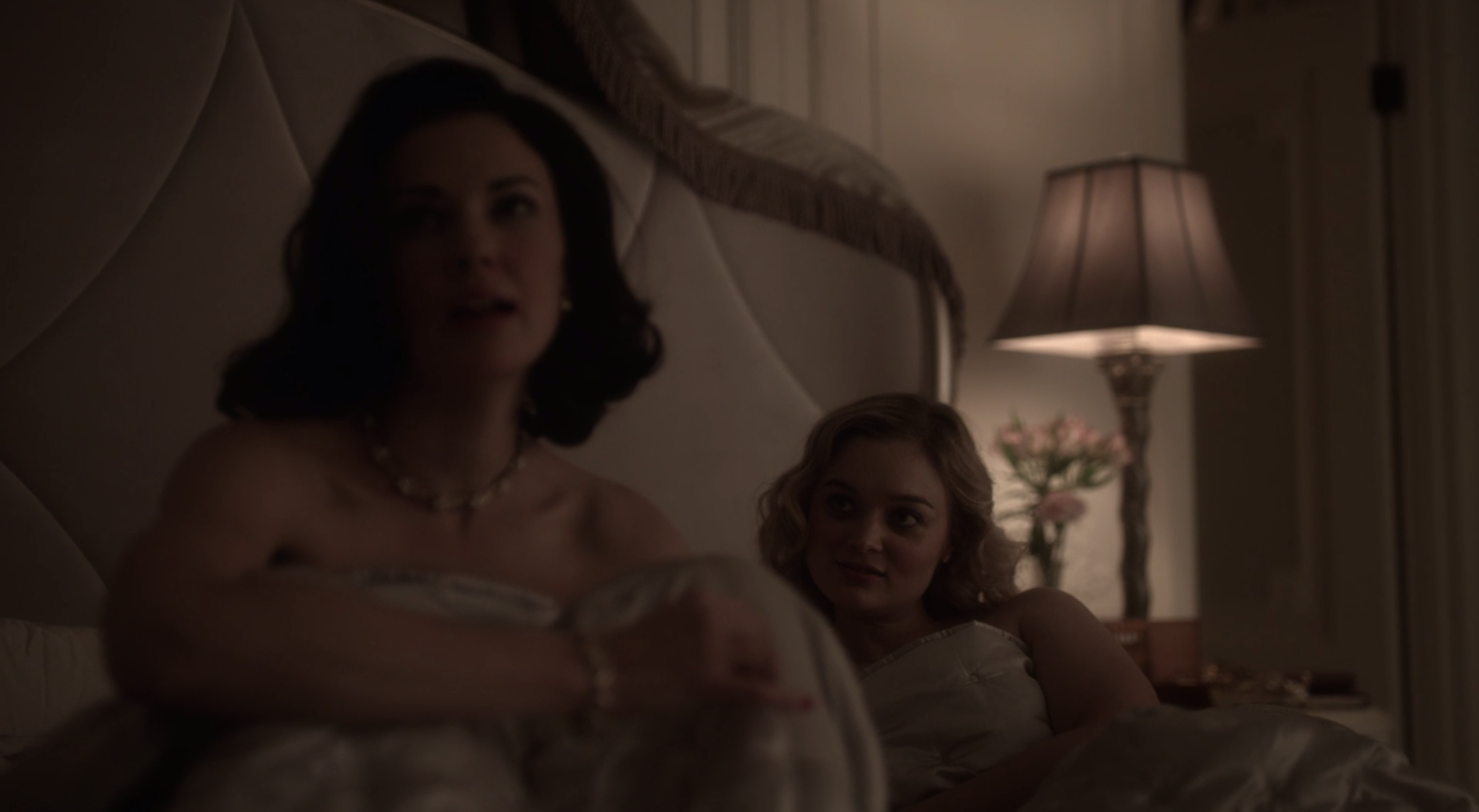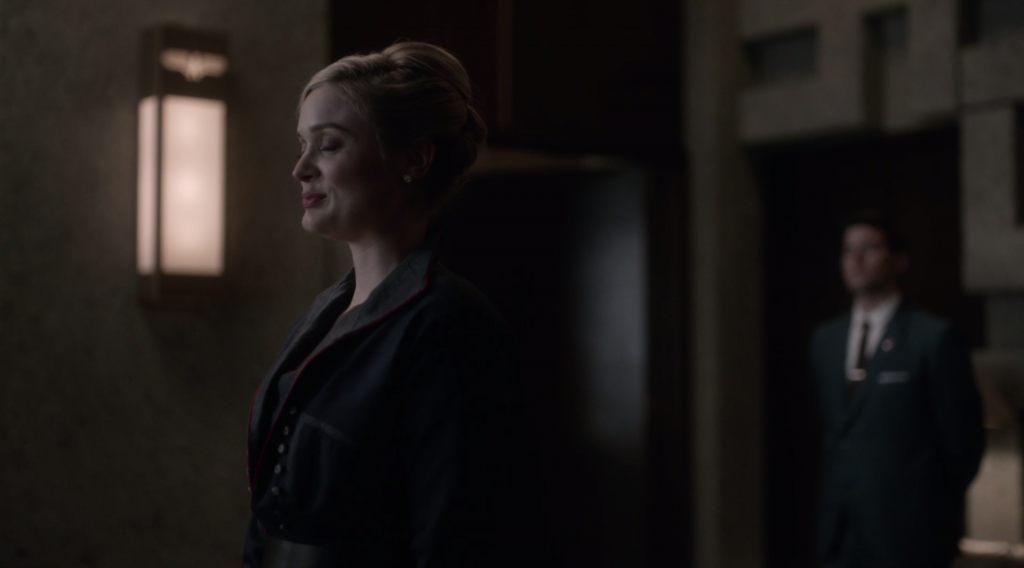I admit it: Nazi fiction has always been big for me. I don’t say that loudly at parties, particularly because I’m half Jewish and fully queer.
I don’t know exactly why the most hive-minded indoctrination machine ever created has always interested me. Maybe it’s due to how well documented their twelve-year “thousand-year” reich was, the fact that their over-the-top displays of a power were often ritualistic or theatrical in nature, or how cracked and crazy most of their ideologies were.
Maybe it’s that their strict, super-tight uniforms remind me of leather, pleather, and PVC outfits kinksters of all genders and sexualities don to display their urge to be freaky.
I might just be onto something here.
I’m not alone in my perverse fascination; Nazis were made to be on the small screen. Usually they’re there to be defeated, humiliated, and beat up. Why do these Nazis often seen vaguely queer, like, in a subverted way? There are layers I could unpack, but not in this essay.
Something has been niggling at the corners of queer and activist communities for a long time.
But a queer Nazi troubles the second and third seasons of Amazon Prime’s The Man in the High Castle. Her hypocrisy really gave me something to consider.
Something has been niggling at the corners of queer and activist communities for a long time; long before it became a big buzzphrase, I considered what “white privilege” meant and how I was living it. This has never been more pertinent to me as when I watch younger alt-right activists in the US go from denying privilege to sometimes being swastika-waving fascists.
The queer Nazi of Man in the High Castle is Nicole Dörmer, a filmmaker. In the show, she’s going to help the Nazis of Greater Nazi Reich (the East Coast of the USA in the MHC world) create a symbol of a new, post-war Nazism. Her film is about blowing up symbols of the old United States but also moving forward from original Nazi culture to an artistic contribution that speaks to younger Nazis. Her art appeals to that evolving ideology.
Let’s give a quick rundown of who exactly Nicole Dörmer—the hip, blonde, blue-eyed, sexy, young, female (and, yes, bisexual) neo-Nazi filmmaker—is. Her character is a disturbing conglomerate of traits that accept and reject indoctrination from the previous generation.
(Warning: Big-time Man in the High Castle spoilers ahead. In fact, if you haven’t seen much of this show, please go watch.)
Dörmer enters the picture when Joe Blake comes back to Germany after his brush with the Underground. He’s a bad-boy, self-loathing antihero who keeps turning his coat, working with underground counterrevolutionaries or his Nazi father, we’re not sure which most of the time. In short, he’s a moody teenager living in an adult body, despite the fact he’s a covert operative for the Reich.
Why so conflicted? Well, his dad, a high-ranking, old-school Nazi officer from the war, produced him in a Nazi love house to be a genetically perfect Aryan or Lebensborn. This means his mom, one of the harem, was like his father’s mistress when he was conceived. She kidnapped and brought him to the US, and he’s just met his dad for the first time. Blake expresses his inherent rage by telling his dad off at a Reich party. Dörmer sees this, and his gall impresses her.
If I have to go into the fact that his Nazi dad is actually heading up a coup to bump off the Führer, this’ll get too involved. But keep it in mind.
Dörmer is also Lebensborn. She convinces Joe it’s not a big deal. Most of the wartime births were engineered in birthing houses. Then she introduces him to a few Lebensborn youth. Most seem to casually enjoy their privileges while engaging in a carefree, bohemian lifestyle. Coddled by power and wealth from the previous goose-stepping generation, the new Hitler youth spend time (when they’re not in their uniforms) partying, taking drugs, driving motorcycles, listening to jazz and rock music, swapping sex partners, writing poetry, and being “liberated.” Dörmer and Blake drop acid and get nasty together in a haze; the next morning, she suggests he try another Nazi babe who’s into him too. She’s a feminist, love-’em-and-leave-’em Nazi dame.
Yes, Dörmer and her pals are Nazi beatniks. Naziniks.

Let’s hit the brakes hard. These neo-Nazis don’t take their history seriously. They didn’t do the war. While they’re not in uniform, politics are someone else’s problem. They are #YOLO. Their presence barely touches the actual beatnik “generation,” which got addicted to a preexisting art form (jazz) and made it a “generation” because when white kids of the 1950s are into jazz (which had existed for three decades before), it’s suddenly a “movement.”
And, sadly, they’re mimicking current alt-right youth, who seem devoid of responsibility for social inequities to the point of denying that social forces such as racism, sexism, or homophobia exist. And let’s admit it: Some embrace a pop-cultural cool that appeals to other young people.
Dörmer is a poignant problem. We learn, much further into the third season, exactly what her film will include. It details a group of the Naziniks joyously tearing down the Statue of Liberty to be replaced by a new statue, something to embody both Nazism and New Nazism. They blow up the Statue of Liberty and replace it with another.
Unite the Right sounds like it comes out of a clichéd dystopian novel, doesn’t it?
And what is this new statue? It’s a statue of Obergruppenführer John Smith’s son, Thomas Smith, who willingly reported himself to be systematically executed after he learned he’d been diagnosed with a genetic defect. His parents tried desperately to hide these facts from Thomas, knowing their consequences. Ironically, his action is celebrated by the Nazi community as an expression of loyalty to the Reich. His heartbroken Nazi father is going to see his executed son as a massive statue designed like something from a Hitler Youth wet dream. His image sets off a riot of Naziniks on the streets of New York.
This would have seemed like a fantasy had I not seen the news of a mass white supremacy march in Charlottesville, and then in Washington, DC, in late 2017. Unite the Right sounds like it comes out of a clichéd dystopian novel, doesn’t it?
Thomas’s death is one of the most poignant emotional turns in the story. From the moment he was informed by Thomas’s doctor, Obergruppensführer (and later Reichsmarschall) John Smith tried to hide evidence of his son’s defect, which dominoes to further suspicion of Smith and his family. By the end of the third season, they’re still threatened.
Dörmer doesn’t see irony in his death; she takes inspiration in Thomas’s sacrifice. His romantic/artistic sacrifice appeals to the Naziniks. She’s immune to the Smiths’ suffering and sees Thomas’s death as high-ranking Nazis do: a PR stunt. He’s symbolic.
When she’s interviewed by a lesbian vixen gossip journalist, Thelma Harris, about the upcoming film, she gives a few covert signals. Later, they overtly discuss a hookup at a hip New York bar. Dörmer is engaged, but as she states, her fiancé has his side relationships, so does she. They’re later seen lounging in lingerie, post-coitus. Thelma warns her while they’re freer in New York than in Berlin, they’re not safe. Dörmer insists her high-profile status as the newest propaganda maker will save them both from any repercussions.
Let’s hit the brakes again. Dörmer is aware lesbians are persecuted under the Reich but expresses no concern. Why should she? She’s convinced her high status saves her and her partners from harm.

And this is the part of the series that hit home. Yeah, Dörmer is a queer character, but she’s a troubling one that beckons up the concerns of racial privilege within the LGBTQ community. She could be compared to Milo Yiannopoulos or any number of other fringe figures who couple queerness with extreme alt-right views, flaunting both.
The LGBTQ community would want to deny white queers like Dörmer exist. Of course being queer absolves us from complicity in abusive relationships to power…right? We’re a minority! We want to be part of the struggle!
No, it doesn’t. We have privilege. Most don’t flaunt it the way Dörmer does, but we can’t help but benefit unfairly.
Now, in reality, I can’t have much to say about white privilege, only I know it exists and I have benefited from it since the day I was born. I didn’t choose to benefit, but I do. I didn’t create the system of privileges, but it’s my job to fight it. End of story.
But there are queers like Nicole who don’t want that responsibility. It’s not on her to deal with the hypocrisy of being both queer and a passionate Nazi; she’s the YOLO generation, exuberant to fully enjoy privilege without care.
She’s definitely got a lot in common with millennial and Gen C “alt-right” online figures who seemingly feel that whatever they say is valid (no matter if it qualifies as hate speech or not) and is protected under “free speech,” and that, furthermore, should shield them from consequences.
Let me make this clear, since I’ve had to explain this so many times. Free speech—or, in other words, the legal right to say what you feel—doesn’t ever shield you from social consequences.
The YOLO generation, even the alt-right YOLO generation, doesn’t live by consequences.
You might have the legal right to say whatever you feel (as long as it’s not hate speech, in the legal definition of that term), but that doesn’t mean your channel might burn down after you express extremist views. “First Amendment violation” can’t be cited every time.
Facebook or YouTube can cite and review any channel to make sure it adheres to community standards, which we we sign and agree to BEFORE we’re allowed to join the platforms.
It is not state-sanctioned censorship, nor is it any form of violation of First Amendment rights, to be cited, locked out, or ousted from a platform. There are plenty of platforms out there with lenient standards, as Gab, 4Chan, and Reddit have proven. It would only count as a First Amendment violation if charges were levied against you or if scandal discredited you.
But of course, the YOLO generation, even the alt-right YOLO generation, doesn’t live by consequences. That’s what makes the new alt-right baffling. Many don’t differentiate between social consequences and legal ones. To them, what happens on the internet—no matter if it actually qualifies as hate speech or not—just stays on the internet. Time and time again, they’re found wincing about the unfairness and “censorship” of a platform not supporting their views.
This all connects to Dörmer and her inherent belief that her dual life will not have an impact on her professional career. She believes her free-living ways should be inconsequential. This makes sense considering she’s coddled as a Lebensborn. She’s representative of millenial/Gen C alt-right extremists who say what they want because content regulations are “unfair censorship.”
I have to hand it to The Man in the High Castle for addressing this point, because it’s worth making. It’s risky making this point too.
And The Man in the High Castle doesn’t disappoint in its treatment of Dörmer. Nicole and Thelma dance at a lesbian bar when the club is raided by gestapo. Dörmer believes she’ll be able to shield herself from harm, and she is able to. But Thelma is not as lucky and is manhandled into a paddy wagon, not seen again.
Dörmer is brought to her premiere under police surveillance, forced to keep up appearances at the gala, and the remaining festivities go down as planned. The attending Nazis enjoy fireworks that destroy the Statue of Liberty, then the goliath statue of Thomas Smith is revealed. But Nicole will not leave the premiere alone. She will be deported to Germany for “reeducation.”
If that sounds scary, that’s because it is. We know what reeducation means in the alternative history world of MHC because we’ve seen it done to Joe Blake at the beginning of season three.
Reeducation reduced Joe to a dirty, haggard, mentally broken mess through torture and mind control. He’s forced to shoot his father, who orchestrated a failed coup on the Führer’s power. His father commands Joe to obey lest he also be killed. And Joe does it.
Joe’s then transformed, cleaned up, given a fresh Nazi uniform, and seen performing the Heil Hitler salute with a blank expression. He’s completely brainwashed; whatever individuality, free will, and ability to decide has been systematically stolen from him.

It’s pertinent to mention the torture Joe endures is similar to techniques once practiced on homosexuals and others who were considered mentally ill. It’s possible reeducation involves partial lobotomy, and it certainly involves shock treatment, as evidenced during in-show interrogations.
It should be mentioned that conversion methods to “cure” homosexuality have, in the past, suggested shock therapy in a so-called therapeutic capacity. The essence of that therapy: to nonfatally shock patients while forcing them to look at same-sex images until the urge is killed. The success rate of such techniques was, unsurprisingly, completely unreliable.
This was, of course, before homosexuality was removed as a condition from DSM-II in 1973, because all research up to that point showed it wasn’t a disorder. However, this would mean that in the 1962 of MHC, the top brass are most certainly damning Dörmer to forced conversion therapy.
We can feel sorry for Joe Blake. He was conflicted; in the end, had he been granted free will, he might have joined the resistance for good. It’s considerably harder for us to extend that same concern to Nicole. Do we care if she comes back as a brainwashed Frau of the Reich?
Of course we care; for better or worse, Nicole had passion and an artistic streak we could admire. She had a joie de vivre. It would be a twisted shame to see her become a Reich automaton.
But this concern is troubled when we consider how completely she benefited from her privilege. She is at ease with the atrocities practiced on her as a Lebensborn. She’s at peace with enjoying additional freedoms of a carefree bohemian lifestyle afforded to her by the former generation but denies responsibility for them. She is completely committed to creating a neo-Nazi passion in the next era of the Reich in the US. Ultimately, this character doesn’t give audiences any emotional payoff. We’re left with a lot of conflicted ideas about her.
But what is certain is that she is a stand-in for the next generation amnestic culture of the alt-right. She, like them, cannot face the possibility they are complicit in (if not the originators of) a system of privileges; if she could, Nicole would live in a new world of her own making and leave the debts of history behind with her ancestors. She, like them, flirts with the big consequences: The Reich will not accept her as she is—they want her to be perfect.
But for now, the popular, hip, social media–savvy, trendy, fashionable, and once in a while queer alt-right youth that garner hundreds of thousands of likes and views, who pin Nazi regalia badges to their social media pages and hashtag white power messages to their pages, who wave Don’t Tread on Mes and Confederate Flags while boosting a selfie thread with automatic weapons, still have a voice. While usually not quite qualifying as hate speech on their various subreddit accounts and 4Chan posts, they can border dangerously close, but when they’re cited and banned, they just move on to Gab. They can live-stream action-packed footage from the most recent clash with antifa and boost their channels, all while technically protected by community standards. Their individuality, sometimes even their queerness, is protected, most of the time.
That is, until there’s a perfection program for them. Conversion therapy is technically still legal in some states.

